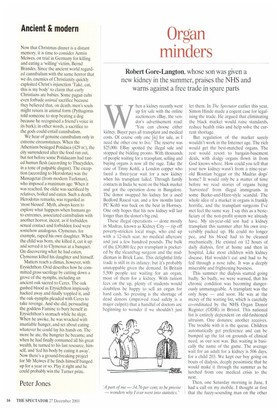Ancient & modern
Now that Christmas dinner is a distant memory, it is time to consider Armin Meiwes, on trial in Germany for killing and eating a 'willing' victim, Bernd Brandes. Since the ancient world regarded cannibalism with the same horror that we do, enemies of Christianity quickly exploited Christ's injunction 'Take, eat, this is my body' to claim that early Christians ate babies. Some pagan cults even forbade animal sacrifice because they believed that, on death, men's souls might return in animal form (Pythagoras told someone to stop beating a dog because he recognised a friend's voice in its bark); in other words, a sacrifice to the gods could entail cannibalism.
We hear of genuine cannibalism only in extreme circumstances. When the Athenians besieged Potidaea (429 nc), the city surrendered after the food ran out, but not before some Potidaeans had tasted human flesh (according to Thucydides, in a tone of palpable disgust). The exception (according to Herodotus) was the Massagetai (from modern Turkman), who imposed a maximum age. When it was reached, the oldie was sacrificed by relatives, boiled and eaten. Such a death, Herodotus remarks, was regarded as 'most blessed'. Myth, always keen to explore what happens when humans go to extremes, associated cannibalism with another horror, incest, as if forbidden sexual contact and forbidden food were somehow analogous. Clymenus, for example, raped his own daughter. When the child was born, she killed it, cut it up and served it to Clymenus at a banquet. On discovering what he had eaten, Clymenus killed his daughter and himself.
Matters reach a climax, however, with Erysichthon. Ovid describes how he committed gross sacrilege by cutting down a grove of the nymphs, including an ancient oak sacred to Ceres. The oak gushed blood as Erysichthon impiously hacked away and finally toppled it, and the oak-nymphs pleaded with Ceres to take revenge. And she did, persuading the goddess Famine to bury herself in Erysichthon's stomach while he slept. When he awoke, he was wracked with insatiable hunger, and set about eating whatever he could lay his hands on. The more he ate, the hungrier he became; and when he had finally consumed all his great wealth, he turned to his last resource, himself, and led his body by eating it away'. Now there's a ground-breaking project for Mr Meiwes if he finds himself banged up for a year or so. Play it right and he could probably win the Turner prize.


























































 Previous page
Previous page